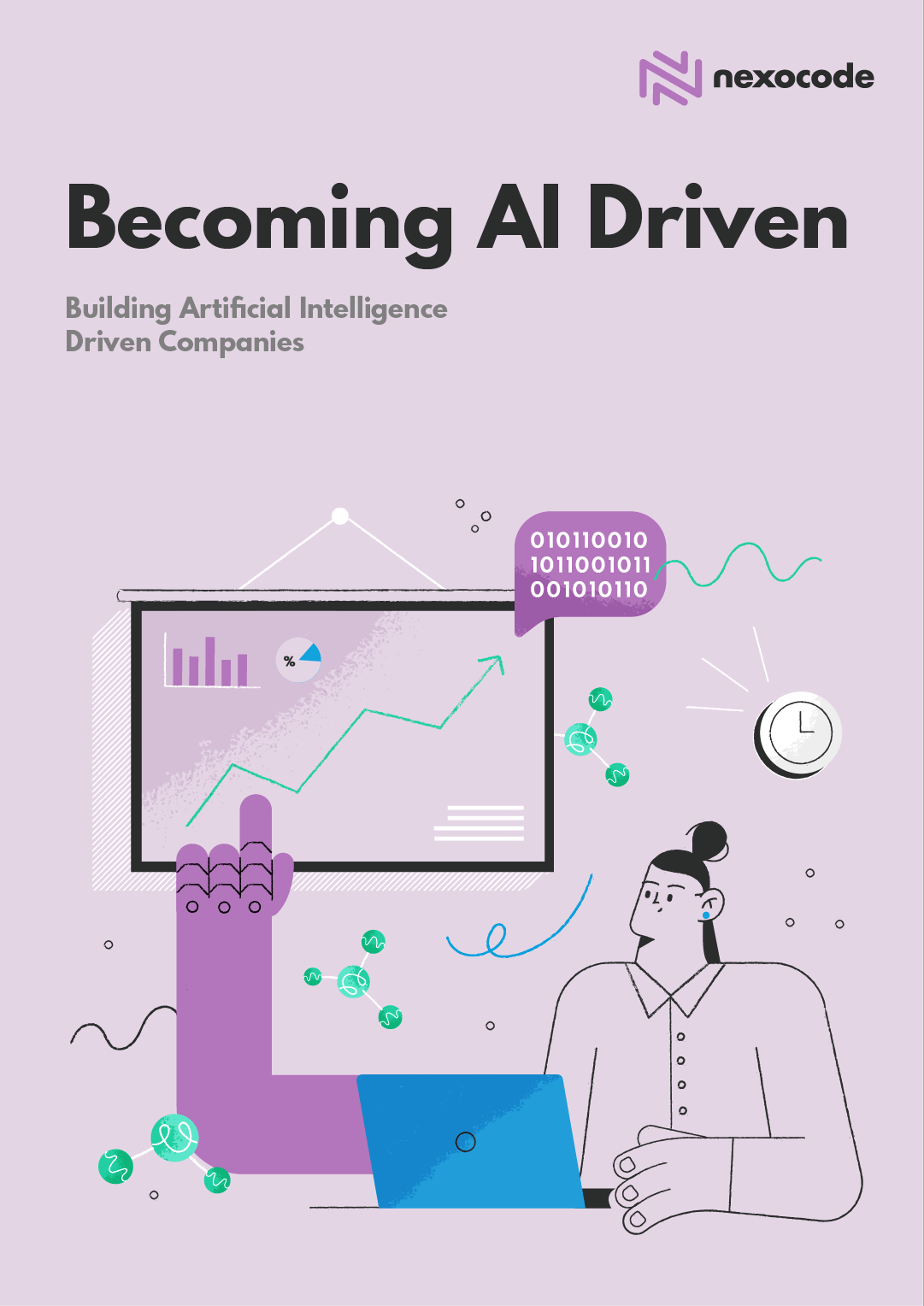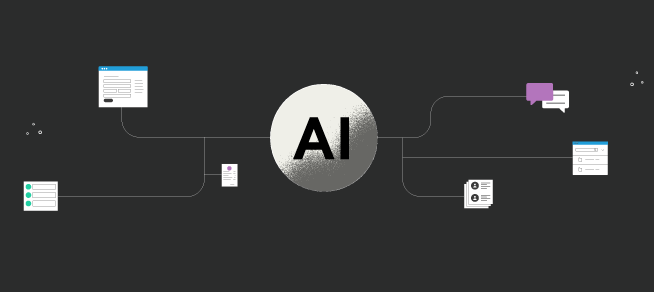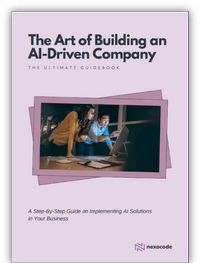Traditional automation has been essential for managing structured, rule-based tasks, but as businesses face more complex processes, unpredictable data, and evolving demands, a smarter approach is needed. AI agents for enterprise are transforming automation by enabling systems to process unstructured data, adapt in real time, and optimize workflows with minimal human intervention.
At nexocode, we specialize in AI agent implementation, helping businesses seamlessly integrate AI-powered automation into their existing systems. Our prebuilt AI agents and custom AI solutions leverage machine learning, natural language processing, and generative AI to automate both routine and complex tasks, reducing manual workload while improving accuracy and cost savings.
By combining large language models, structured data processing, and intelligent agent architecture, our AI systems handle specific tasks like data entry, inventory management, and customer queries, while also enhancing decision-making and operational efficiency.
Let’s explore three key areas where AI agents and generative AI are revolutionizing business operations—and how nexocode’s expertise can help your organization stay ahead.
Handling Unstructured and Imperfect Data
Many business processes and complex tasks rely on inputs that arrive in varied formats, incomplete states, or non-standardized structures. Traditional automation struggles to process such data, often requiring employees to manually clean, format, and validate inputs before they can be used.
AI agents eliminate this bottleneck by understanding, processing, and structuring unstructured data using machine learning models and natural language processing. Instead of requiring perfect inputs, AI agents extract relevant details, cross-check them against business rules, and handle discrepancies automatically.
How nexocode AI Agents Help:
- Process scanned documents, handwritten notes, and varied digital formats without manual intervention
- Automatically extract, validate, and structure key business data for faster decision-making
- Reduce time spent on data entry, document processing, and compliance validation
📩 Want to streamline your data processing workflows?
Let’s discuss how our AI agents can help.
Moving Beyond Task Automation to End-to-End Process Optimization
Many enterprise workflows are too complex for rule-based automation alone. Conditional logic, variations in process execution, and frequent exceptions make scripting every scenario impractical. Traditional automation solutions often hit a limit when workflows become too dynamic to be handled by predefined rules.
AI agents take a different approach. Instead of following rigid instructions, they analyze workflow patterns, prioritize tasks, and determine the best way to execute them in real time. They collaborate with existing automation tools, human employees, and other AI-driven systems to optimize workflows efficiently.
How nexocode AI Agents Help:
- Decompose complex workflows into smaller, manageable tasks
- Combine AI decision-making, generative AI, robotic process automation (RPA), and real-time API integrations
- Ensure that human agents are only involved in high-priority exceptions
For example, in financial compliance, AI agents can analyze transactions in real-time, automatically identifying anomalies while reducing false positives. Instead of compliance teams wasting time reviewing irrelevant alerts, AI agents prioritize actual risks for faster, more effective fraud detection.
Making AI Agents Accessible to Business Users
For AI-driven automation to reach its full potential, business users need to be able to interact with AI agents effortlessly, without requiring deep technical expertise or extensive programming skills. While large language models (LLMs) have improved natural language understanding, many AI solutions still require complex configurations or technical knowledge to function effectively.
We understand this issue and that is why at nexocode our approach covers process analysis and AI Agent impementation into a user-friendly and beneficial flow. Instead of manually scripting processes, we work with business users to describe their objectives and challenges, and we setup AI agents securely to cover the flow in the best possible way.
How our approach to AI Agentic architecture for enterprises eases the pain:
- Bridge the gap between product teams and technical departments, enabling faster AI adoption
- We cover very peculiar use cases with tailored, fine-tuned models that work with company data sources
With nexocode’s AI agent implementation services, companies can scale AI automation across multiple departments, from finance and operations to customer service and logistics, without requiring an AI development team.
📩 Want to integrate AI into your business without the complexity?
We’re here to help.
AI Agents in Action: Real-World Use Cases Across Industries
AI agents are actively transforming business operations across industries, handling complex tasks and delivering measurable results. By leveraging natural language processing, machine learning models, and structured data analysis, AI agents optimize workflows, improve efficiency, and reduce operational costs.
AI agents in manufacturing, logistics, and supply chain
AI-driven automation is improving procurement, supplier negotiations, and logistics management, helping businesses reduce costs and improve efficiency in sourcing and order fulfillment.
✅ Procurement and RFQ automation: AI evaluates supplier responses, ranks proposals, and selects the best option based on cost, quality, and delivery times—automating order preparation for seamless procurement.
✅ Autonomous negotiations: AI agents analyze supplier offers, negotiate optimal terms, and finalize deals with minimal human involvement, ensuring better pricing and contract terms.
✅ Autonomous freight matching: AI instantly matches shipment requests with the best available carriers, optimizing transportation efficiency and reducing delays.
✅ Object detection in manufacturing: AI-powered computer vision detects defects in production lines, flags issues, and triggers automated repairs, ensuring higher product quality.
✅ Dynamic pricing for freight: AI adjusts freight pricing in real time based on market demand, shipment urgency, and route efficiency, maximizing profitability.
✅ AI-driven compliance and document verification: AI agents analyze transport documents, verify compliance, and update systems automatically, reducing manual paperwork.
AI agents in retail and inventory management
AI automation is enabling retailers to predict demand, optimize stock levels, and improve order fulfillment—reducing waste and increasing revenue.
✅ Demand prediction: AI analyzes sales trends to forecast demand, preventing stockouts and reducing excess inventory.
✅ Inventory management: AI monitors stock levels, detects shortages, and automates reordering to keep inventory at optimal levels.
AI agents in back-office and organization
AI-powered automation is streamlining internal processes by enhancing knowledge management, employee support, and document processing.
✅ Knowledge management: AI ingests and categorizes company documents, making internal knowledge instantly searchable and accessible.
✅ Internal support automation: AI-powered virtual assistants respond to employee queries, escalate complex issues, and suggest relevant solutions.
✅ AI-powered workforce scheduling: AI forecasts staffing needs based on demand, creating optimized work schedules for better resource allocation.
✅ Paper hourly reports automation: AI extracts, verifies, and digitizes handwritten timesheets, ensuring accurate reporting and compliance.
Ensuring AI Agents Operate Securely and Transparently
AI agents introduce new levels of autonomy and adaptability, but businesses need to ensure they operate within clear boundaries, with accountability and transparency. At nexocode, we implement AI solutions with built-in monitoring, compliance, and human oversight, ensuring AI agents align with business policies and objectives.
To ensure safe and effective AI adoption, we focus on:
- Secure integration with enterprise systems – AI solutions are deployed within cloud, on-premises, or hybrid infrastructures, ensuring full data security and compliance
- Keeping humans in the loop – AI agents assist decision-making but defer final approvals to human operators when needed, according to designed worklflow
- Real-time monitoring and performance tracking – AI-driven processes are continuously tracked and optimized for accuracy
The Future of AI-Driven Automation
AI agents are redefining how businesses operate b y moving beyond rigid, rule-based automation to adaptive, AI-powered decision-making. Companies that leverage AI agents today will gain a significant competitive advantage, benefiting from:
- Faster decision-making powered by AI-driven data analysis
- More efficient workflows with less manual intervention
- AI-powered automation that continuously learns and adapts
Our team specializes in implementing AI solutions that seamlessly integrate with existing systems, automate complex workflows, and drive real business outcomes.
📩 Ready to take your business automation to the next level?
Let’s connect and explore AI-driven solutions tailored to your needs.







